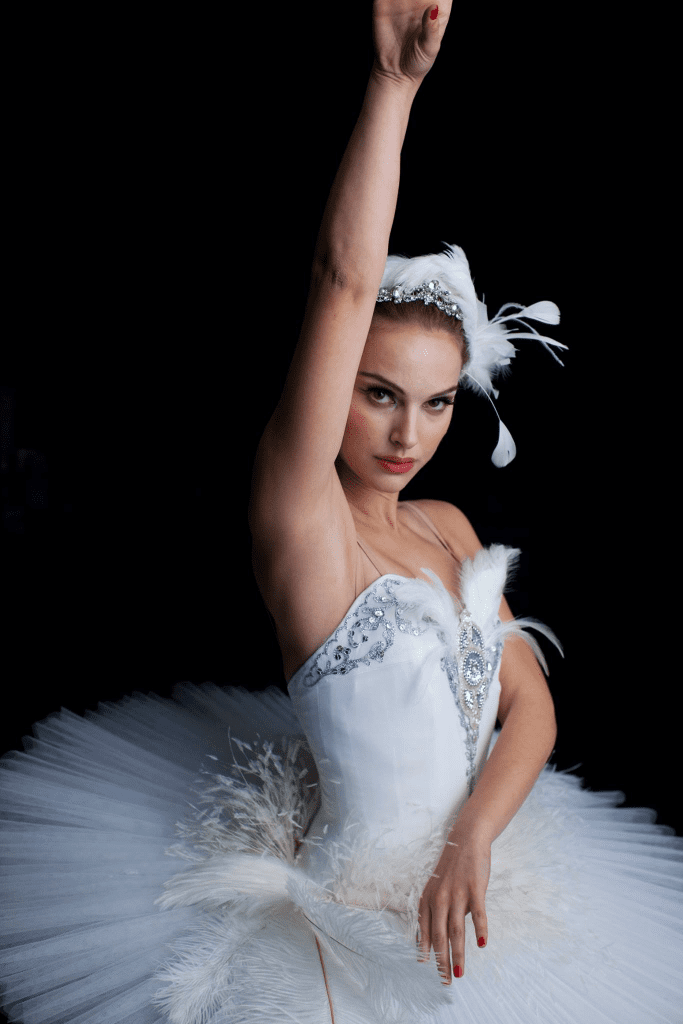
Natalie Portman’s portrayal of Nina Sayers in Black Swan remains one of the most celebrated performances in modern cinematic history. Directed by Darren Aronofsky, the 2010 psychological thriller takes audiences on a gripping journey into the high-stakes world of ballet. With themes of obsession, duality, and self-destruction, the film captivated audiences worldwide, and Portman’s transformation into Nina earned her an Academy Award for Best Actress. This performance stands as a shining testament to her commitment and skill as an actress.
At its core, Black Swan tells the story of Nina Sayers, a talented but emotionally fragile ballerina striving for perfection. When her ballet company announces a new production of Swan Lake, Nina is cast as the lead—a role that demands she embody both the delicate White Swan and the dark, sensual Black Swan. Nina’s relentless pursuit of perfection soon pushes her to the edge, blurring the lines between reality and her hallucinations.
Darren Aronofsky’s direction infuses the film with a haunting atmosphere, balancing the beauty of ballet with the terror of Nina’s unraveling psyche. However, it is Natalie Portman’s portrayal of Nina that transforms the film into a cinematic masterpiece.
To prepare for the role, Natalie Portman immersed herself in rigorous physical and emotional training. For over a year, she worked with professional choreographers and ballet instructors, training up to eight hours a day to perfect her movements. Portman also underwent a dramatic physical transformation, losing 20 pounds to match the physique of a professional dancer. This dedication to authenticity adds an extraordinary layer of believability to her performance.
Her preparation extended beyond physical training. Portman explored Nina’s psyche with profound depth, capturing the character’s vulnerability, paranoia, and eventual descent into madness. Every gesture, glance, and movement reflects the intense psychological turmoil that Nina experiences throughout the film.
One of the most compelling aspects of Black Swan is the duality of the Swan Queen, a role that requires the dancer to embody both the innocent White Swan and the seductive Black Swan. Portman’s ability to portray this contrast is nothing short of extraordinary. As the White Swan, Nina is timid, reserved, and consumed by self-doubt. Her movements are precise but lack the passion and freedom required for the Black Swan.

As the story progresses, Nina’s darker instincts emerge, transforming her into the uninhibited Black Swan. Portman’s transition between these two personas is seamless, showcasing her range and versatility. The climactic scene, where Nina fully embodies the Black Swan during her performance, is mesmerizing. Her intense gaze, fluid movements, and chilling transformation leave an indelible mark on the audience.
Black Swan explores the dangerous consequences of perfectionism and obsession. Nina’s single-minded pursuit of excellence becomes her undoing, driving her to the brink of insanity. Her relentless quest to embody the duality of the Swan Queen leads her to lose touch with reality, culminating in a tragic yet beautiful unraveling.
Portman’s performance captures this obsession with remarkable precision. She conveys Nina’s desperation, self-doubt, and fleeting moments of triumph in a way that resonates deeply with viewers. The film also sheds light on the pressures of the ballet world, where competition, physical demands, and the pursuit of perfection often take a psychological toll.

Nina’s rivalry with Lily, played by Mila Kunis, adds another layer of complexity to the story. Lily represents everything Nina is not—carefree, spontaneous, and naturally sensual. As Nina perceives Lily as both a threat and an inspiration, their dynamic oscillates between friendship and rivalry. Portman and Kunis deliver compelling performances, creating a tension-filled relationship that drives much of the film’s drama.
The ambiguous nature of their relationship, combined with Nina’s growing paranoia, keeps the audience questioning what is real and what exists only in Nina’s mind. This interplay between the two characters underscores Nina’s internal struggle and her eventual transformation.
Natalie Portman’s performance in Black Swan received universal acclaim. Critics hailed her portrayal as one of the finest in contemporary cinema, praising her ability to balance vulnerability and intensity. Portman’s work earned her numerous accolades, including the Academy Award, Golden Globe, BAFTA, and Screen Actors Guild Award for Best Actress.

The film itself was a critical and commercial success, grossing over $300 million worldwide. Its innovative storytelling, coupled with Aronofsky’s direction and Portman’s performance, secured its place as a modern classic.
While Natalie Portman was already an established actress prior to Black Swan, this role elevated her career to new heights. It showcased her ability to fully immerse herself in a character, solidifying her reputation as one of the most talented actresses of her generation. Following the film’s success, Portman continued to take on diverse and challenging roles, further cementing her legacy in Hollywood.
Her work in Black Swan also set a new benchmark for actors willing to push their boundaries. Portman’s dedication to the role, both physically and emotionally, serves as an inspiration to aspiring performers and her peers.

Natalie Portman’s portrayal of Nina Sayers in Black Swan is a performance that transcends time. Her ability to convey the complexities of obsession, ambition, and duality makes the film an unforgettable experience. Through her dedication, talent, and emotional depth, Portman created a character that continues to resonate with audiences and remains a defining moment in her career.
Black Swan is more than just a film; it is an exploration of the human psyche, the beauty of art, and the darkness that often accompanies ambition. At its heart is Portman’s transformative performance, a true testament to her brilliance as an actress. This role not only secured her place among Hollywood’s elite but also left an enduring legacy in the world of cinema.


